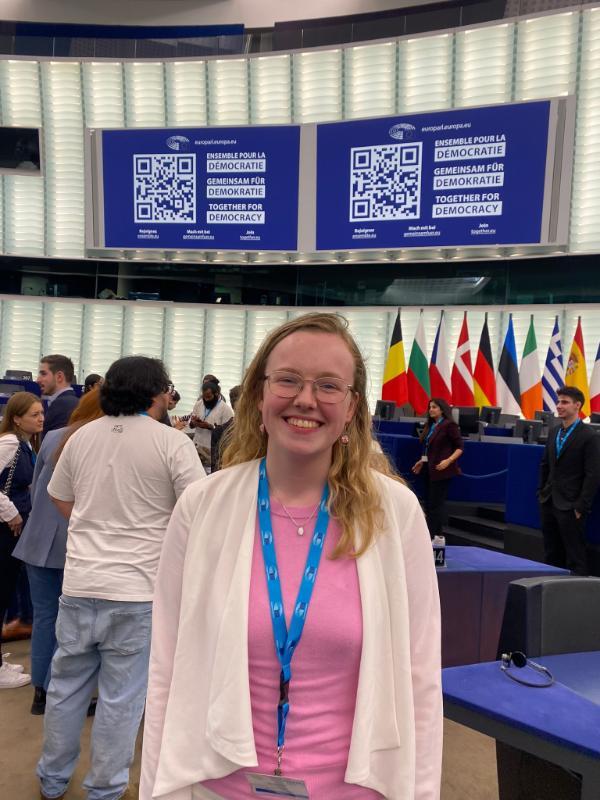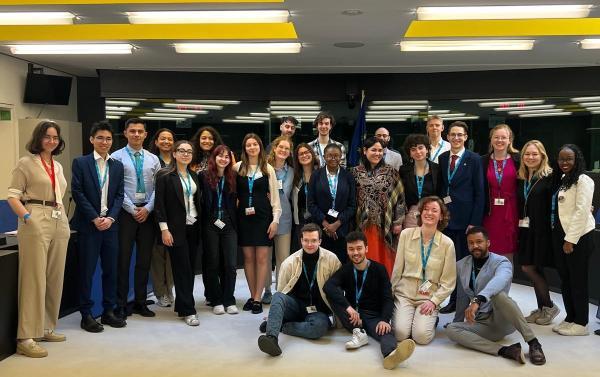The European Student Assembly (ESA) is an annual gathering of students from various European Universities Alliances to debate current issues and draft political recommendations for the future of Europe.
This year, from 10–12 April, more than 250 students from 170 institutions involved in 41 European Universities Alliances gathered at the European Parliament in Strasbourg to discuss topics corresponding to European and global issues, and to propose recommendations for dissemination among the stakeholders and decision-makers at a local, national and European level.
UCD students had an opportunity to apply to participate in ESA 2024 thanks to UCD's membership of Una Europa. UCD Global facilitated and provided support for the student visits.

Katie O’Sullivan, a 3rd year Law student, represented UCD and Una Europa at ESA 2024. Read what Katie had to say about her experiences below. Plus, check out her video on (opens in a new window)Instagram.
“I applied to participate in ESA 2024 because I wanted to get involved in the Una Europa alliance. I watched Una Europa opportunities shared by UCD Global throughout the year, and Una Europa’s mission to empower students was definitely something I wanted to take part in.
I want to pursue a career in international human rights law, so being able to contribute my work and opinions on a supranational level was massively enticing. Of course, to contribute my opinions, I also needed to learn, and the Assembly provided the opportunity to listen to experts on European issues and work with students with the same passions as me through different perspectives. Lastly, there was absolutely no way that I was going to bypass the opportunity to go to Strasbourg!
The panel
In the three months building up to the European Student Assembly, everything took place online. We had lectures that all participants attended and lectures that were panel-specific. Afterwards, we had panel meetings which were geared at developing our proposals.
I was on Panel 4, entitled ‘Seeking a better future in the EU’. Our proposals had to answer the question “What strategy should the EU adopt to guarantee a treatment with dignity of migrants from outside of the Union?” We deduced four main areas to be covered. I was in the subpanel which dealt with integrating migrants into society. We came up with proposals on accommodation, a grant for civil society organisations and support for working migrants.
As my main interest is human rights, I have always been concerned about the rights of migrants. However, this Assembly gave me the opportunity to give the topic the attention it warranted. When the Ukrainian invasion broke out, my family tried to pledge accommodation to refugees and discovered what a convoluted process it was. This experience inspired me to organise a house debate for the UCD Literary & Historical Society on whether Ireland was failing Ukraine. I therefore had knowledge of issues migrants faced, but from a very specific perspective. Through the panel I learned about challenges faced by other member states and delved into the EU's overall human rights crisis. This experience expanded my perspective beyond Ukraine, allowing me to be educated on migrant rights on a broader scale.
Our panel came up with 10 proposals which we shortened to 8 to propose to the Assembly. They included making EU borders compliant with human rights standards, ensuring access to adequate accommodation and supporting family reunification. We organised these proposals in chronological order, starting from a migrant's arrival at the border and progressing towards fostering public solidarity. Finally, it was time to meet each other face to face!

The Assembly
All three days of the Assembly took place at the European Parliament. When all 250+ participants came together, we would sit in the Robert Schuman Hemicycle. On the first day we had a welcome address, which included speeches from the presidents of the University of Strasbourg and of the Franco-German University. Then the panel coordinators explained what their panels had been working on. Finally, we split up into our separate panels to finalise our proposals.
Day two was dedicated to inter-panel debates. I got the opportunity to consult the budget panel and the Euroscepticism panels on their policies, and two policies were altered based on my advice.
On day three we all came together to vote on every single proposal put forward by the panels. We could vote in favour, reject, or abstain. There was one point where a proposal was one vote away from being rejected and I had abstained – so our vote absolutely mattered!
Of course there were also the less serious parts: we all had lunch together in the Parliament each day, had dinner together at the hostel each night, took photos in the main hemicycle, got a tour of Strasbourg, and got to walk through security each morning and be welcomed like VIPs. Our accommodation was arranged for us until the day after the Assembly, so I enjoyed a day of sightseeing and shopping before heading to the airport.
The results
The highlight of the experience for me was seeing the proposal that I had taken the lead on, ‘Create an EU Grant Programme to maintain public willingness to support migrants’ displayed on the big screens in the Robert Schuman Hemicycle and voted through by the Assembly. This proposal was the last one our panel put forward, so this was also the moment we realised that all our proposals had passed. It was surreal and we were all so proud of ourselves.
The Assembly taught me how to accept criticism, how to deliver it, and how to be vulnerable and put my ideas forward. I made an incredible number of new friends, and we all exchanged our LinkedIn accounts and contact details on the last day, so I will be able to see how everyone gets on with their careers. We have also all been added to the ESA Alumni Network. I absolutely recommend participation in next year’s Assembly, or any opportunity Una Europa puts forward for that matter!
ESA 2024 presented 82 recommendations, with 3 rejected, ultimately proposing 79 policy recommendations for the student body to advocate for in front of stakeholders and decision-makers in the coming period. Learn more about the policy recommendations and next steps (opens in a new window)here.
Check out Katie's video on (opens in a new window)Instagram.
(opens in a new window)Read about other Una Europa students' experiences at ESA 2024